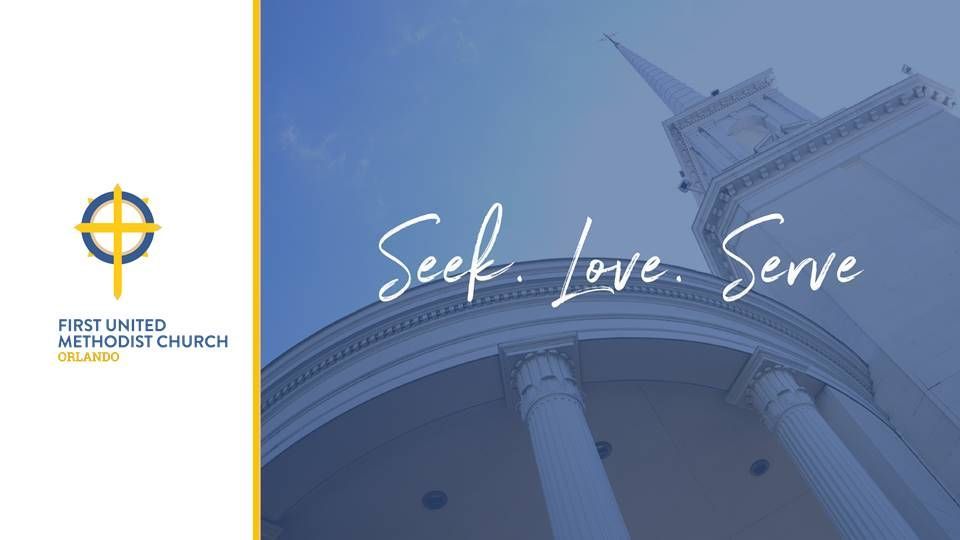Answering Questions Regarding Same-Gender Weddings and Marriages
Answering Questions Regarding Same-Gender Weddings/Marriages at First Church.

Reading through the comments/questions/concerns given in response to our online “straw poll” regarding First Church Orlando possibly joining the Reconciling Ministry Network of the United Methodist Church, several have clearly stated their opposition to same-gender marriage, particularly in the Church. I’m not surprised that some at First Church feel that way. That has certainly been the assumed Christian teaching for two millennia and the official policy of the United Methodist Church.
But, LGBTQ+ couples have lived in common-law marriages throughout history, often carefully hidden under the guise of “friends” or “roommates,” when laws and societal prejudices kept many LGBTQ+ persons fearfully closeted. For at least the past 50+ years, some Methodists have fought to recognize the validity of same-gender unions, even when the option for legal, secular marriage was unavailable, and seemingly impossible.
But, in 2003, Massachusetts legalized same-gender marriage, followed by other states, which was eventually affirmed nation-wide by the U.S. Supreme Court in 2015.
So, there have always been same-gender marriages in the church – some disguised as friends/roommates, some as non-legalized unions - and some, since 2003 - as legally married couples. Though there’s only been one same-gender wedding performed at First Church Orlando (so far), many legally married same-gender couples have joined our church as members since same-gender-marriage was legalized.
Though the policies prohibiting same-gender weddings in UMC churches are still in place (largely due to cancelled international gatherings due to the Covid Pandemic), the penalties for breaking those rules no longer exist and prohibitions will likely soon be removed from the UM Book of Discipline, entirely.
Let me clarify: though the Reconciling Network does advocate for the rights of same-gender marriages, those weddings WILL now be happening (and already are) in UM churches, whether they affiliate with RMN or not. Same-gender weddings WILL happen at First Church Orlando in the not-to-distant future, whether we become a reconciling church or not.
Those who object to same-gender weddings and marriages often claim to advocate for a biblical model of marriage, between one man and one woman. I can’t deny that every example of marriage in the Bible is heterosexual. Same-gender marriage didn’t exist in biblical times – more on that momentarily.
But, let’s talk about marriage in the Bible.
To begin with, marriages were “arranged”: binding legal agreements, typically between a man and a bride’s father, often while the future bride was still in puberty. The bride had no voice in this arrangement, at all. It was a legal transaction, transferring property (the bride and the bride price) from one party to another. Yes – I just referred to the bride as property! In biblical times, women/wives were property, owned by men, without legal rights. They were not equal marital partners. Needless to say, not too romantic or respectful to women!
Furthermore, that patriarchal arrangement is biblically identified as a result of the Fall. Following the unfortunate incident of Adam and Eve eating the forbidden fruit, God said to Eve and her female descendants, “I will make your pregnancy very painful; in pain you will bear children. You will desire your husband, but he will rule over you.” Didn’t Jesus come to undo the curse of the Fall? Didn’t Jesus come to make us a New Creation? Didn’t Paul say, “All of you who were baptized into Christ have clothed yourselves with Christ. There is neither Jew nor Greek; there is neither slave nor free; nor is there male and female, for you are all one in Christ Jesus.” (Galatians 3:27-28)
Returning to the topic of biblical/heterosexual marriage, the purpose of marriage – as practiced in biblical times – isn’t what you likely think. The purpose of marriage was primarily about producing male heirs for the husband. In fact, not having sons was blamed on the wife, and source of great shame. Add to this, the need for the nation of Israel to grow numerically in order to survive in a world hostile to Israel’s existence! Any surprise the Jewish scriptures advocates for heterosexual marriages producing many offspring? Israel’s survival and growth depended on it!
First of all, a large family – hopefully with as many male offspring as possible – provided increased laborers to increase their family’s wealth, as well as protection from outside threats. And, we forget, there’s no teaching about an afterlife in the Old Testament – that doesn’t come until Jesus’ resurrection. Before the possibility of eternal life, one’s legacy and life-work only existed beyond one’s death in one’s living heirs. And, speaking of heirs, it was critically important in ancient Jewish society to know who was the eldest son and how the deceased’s estate would be divided to heirs accordingly. Thus, the strict biblical commands regarding sex outside of marriage had less to do (nothing, actually) with violating the trust between a husband and a wife, or sexual purity, and MUCH more to do with potential confusion over who may or may not be rightful heirs of the dead man’s wealth, in an age when DNA tests didn’t exist.
May I also add the countless examples of heterosexual marriage that did NOT fit our falsely romantic ideas of one man and one woman? How about the many examples of polygamous marriages among those hailed as biblical heroes (Abraham, Jacob, David, Solomon, etc)? How about the significant number of biblical men engaging with prostitutes? How about the biblical law requiring raped women to marry their rapists? How about the frequent use of sex-slaves in the Old Testament (that’s actually what the word ‘concubines’ means)? How about the marriages of Jewish leaders with non-Jewish wives, who often seduced Jewish husbands to worship their foreign gods? How about the number of Jewish leaders who committed adultery? How about Levirate law (Google it, if you don’t know.)?
Think about Jesus’ own ancestry. Jesus came from the tribe of Judah, whose Patriarch – Judah – had sex with his daughter-in-law, thinking she was a prostitute. Matthew 1:5 mentions Rahab, a prostitute. Matthew 6 mentions “the wife of Uriah” – Bathsheeba – whom David invited to the palace, had sex with (no mention of her willing participation), was impregnated, and then David arranged for Uriah’s death in battle to cover-up his sin. That same David had multiple other wives, and died in the arms of his young concubine, Abishag. And, lest we forget, Jesus was born to an un-wed mother. The fact that Jesus, by age thirty – when he began his public ministry – was still unmarried and childless, is also surprising, given the expectation that every Jewish male would marry, and produce children.
And, while we’re on the topic of Jesus, many have observed just how little Jesus talked about marriage, sex, and sexuality. He called disciples to follow him, requiring they leave wives and families behind. On one occasion, Jesus did advocate for marriage as an unbreakable bond, clearing condemning divorce (which is so widely accepted today). He didn’t condemn the Samaritan woman at the well, who had been married multiple times, but became his first Samaritan evangelist. He didn’t condemn the woman caught in adultery, sending her accusers away in shame. Jesus was often accused/condemned of spending too much time around prostitutes.
The point is, though there’s nothing in the Bible, specifically, allowing for same-gender marriage, it hardly gives us many examples for the sanctity of heterosexual marriage, as so often mis-interpreted by advocates of heterosexual-only marriages. Biblical marriage, as revealed in Scripture, doesn’t look very much like the Hallmark images we’ve grown accustomed to!
In fact, much of what has been mis-read as biblical condemnation of homosexuality has been grossly misinterpreted. There are just a few biblical passages – often referred to by LGBTQ+ advocates as “Clobber Scriptures” – condemning the use of young prostitutes and the use of temple prostitutes to unite with foreign deities, which have been routinely, tragically misinterpreted to mean ANY same-gender sexual contact. That’s simply incorrect. The condemnation is for prostitution and idol worship, not the exclusive, committed relations of two same-gender persons, or their sexual orientations, because that was a foreign notion in biblical times. They didn’t get. They couldn’t get it.
And, with all due respect to the Bible, it simply isn’t a science book. That’s not what the Bible is for! There’s simply no way non-heterosexual sexual orientation could have been understood in biblical times. Heck, we hardly understand it now! But, I can point you to dozens of examples of scientific errors throughout the Bible – from the Creation story, to misunderstandings regarding reproduction, to human anatomy, to where rain comes from, etc.
Obviously, the Bible DOES teach that marriage is meant to be holy – “What God has joined together.” Obviously, the Bible teaches that that we need someone to share our life with – “It is not good for man to be alone.” The Bible does teach us to honor our spouses, to be like Christ for them. The Bible even teaches that marriage can serve as a living example of the covenantal relationship between Christ and the Church.
But, why does marriage have to be exclusively between a man and a woman to be holy? I can think of countless heterosexual marriages that aren’t particularly holy! Why can’t two men or two women make the same covenantal commitment a heterosexual couple can? What makes their love and commitment less? Why can’t a same-gender couple reflect a Christ-filled marriage as much as any heterosexual marriage? And, if two men or two women wish to be married, before God, in a Christian ceremony, in a Church, by a pastor, why would we deny them that opportunity, requiring they settle for a secular ceremony, when their desire and intent is deeply spiritual?
And, I would ask objectors to same-gender weddings and marriages in the church, why would you deny that right or opportunity to others? How does their marriage adversely affect yours? Shouldn’t we celebrate anyone who wants to bring more of Jesus into their lives, marriages and families, and not less?
I would love to hear your thoughts and opinions. You can email me (vance@firstchurchorlando.org) or comment below.





